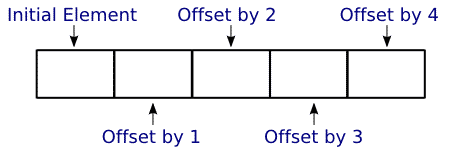|
Understanding the Use of Arrays
with Examples in Java |
|
Prof. David Bernstein |
| Computer Science Department |
| bernstdh@jmu.edu |
|
Understanding the Use of Arrays
with Examples in Java |
|
Prof. David Bernstein |
| Computer Science Department |
| bernstdh@jmu.edu |
What do you think of the following fragment?
total = 0.0;
total = total + income1;
total = total + income2;
total = total + income3;
total = total + income4;
total = total + income5;
total = total + income6;
total = total + income7;
mean = total / 7.0;
Arrays offer the same kinds of benefits of subscripts in mathematical notation -- this fragment is more compact, more readable, and more flexible.
total = 0.0;
for (int i=0; i<n; i++)
{
total = total + income[i];
}
mean = total / income.length;

[]
Modifier:
int[] income;
[]
Length Specifier:
income = new int[20];
[]
Operator:
income[5] = 250000;
x = payment(income[0]);
payment(int[] income)
main(String[] args)
y = meanPayment(taxableIncome);
public int[] schedule(){...}
length contains the number of elements (and
is initialized when memory is allocated)clone() makes a (shallow) copylength Attribute
int i;
int[] strikeouts;
strikeouts = new int[9];
for (i=0; i<strikeouts.length; i++)
{
strikeouts[i] = 0;
}
length Attribute (cont.)
int i;
int[] strikeouts;
strikeouts = new int[9];
.
.
.
// This will not work because the length attribute
// is declared to be final (which means it cannot be
// changed after it is initialized)
//
strikeouts.length = 5;
clone() Method
int[] copy, original;
original = new int[3];
original[0] = 2001;
original[1] = 1995;
original[2] = 2001;
copy = original.clone();
length
NullPointerException when using method/attribute
IndexOutOfBoundsException when accessing
an elementArrays Utility Class
The Arrays class (in the java.util package)
class contains several static methods that are very convenient when
working with arrays.
import java.util.Arrays;
int target;
int[] a;
a = new int[100];
Arrays.fill(a, 0); // Fill a with zeroes
Arrays.fill(a, 1, 10, 99) // Fill a[10] thru a[99] with ones
...
Arrays.sort(a); // Sort a in ascending order
// Searches for 5 in a and returns 5 if found
// The array must be sorted
//
target = Arrays.binarySearch(a,5);